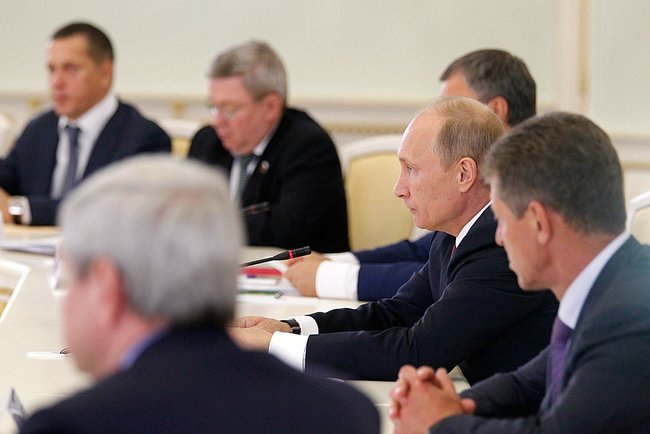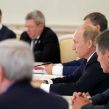
Presidential Council on Inter-Ethnic Relations Meets in Saransk
Publication: Eurasia Daily Monitor Volume: 9 Issue: 165
By:

On August 24, in the ethnic republic of Mordavia, Russian President Vladimir Putin met with the recently re-instituted “Council for Inter-Ethnic Relations.” The Council, which Putin had dissolved in 2001, was re-established in June 2012. The timing and location of the first meeting symbolically celebrated 1,000 years since the union of the Mordavian and other Russian peoples. Those present at the meeting included President Putin; Deputy Prime Minister Dmitry Kozak; Deputy Head of the Presidential Administration Vyacheslav Volodin; the President of the Association of Small-Numbered Indigenous Peoples of the North, Siberia and the Far East Sergei Kharyuchi; the Head of the Presidium of the Council of the Association of Finno-Ugric Peoples of Russia Pyotr Tultayev; Director of the RAS Institute of Ethnography and Anthropology Valery Tishkov; Chairman of the Public Council of the Moscow House of Nationalities Vladimir Zorin; a member of the Russian Public Chamber, the journalist Maxim Shevchenko; the President of the Union of Georgians in Russia Mikhail Khubutia; and the Head of the Public Chamber Committee for Inter-Ethnic Relations and Freedom of Conscience Nikolai Svanidze. (https://www.itar-tass.com/c154/503000.html). Missing from the meeting, however, were any representatives of ethnic minority separatist groups, an important omission given the task of the Council to “improve public policy in the sphere of inter-ethnic relations” (https://www.itar-tass.com/c154/503000.html).
In the press conference following the meeting, Putin outlined three priorities agreed upon for the Council. First, he called for the strengthening of Russia as a “unique global civilization” that has existed for hundreds of years. Second, he asserted there is a need to consolidate the sense of “civic unity” amongst the peoples of Russia. Third, Putin called for the harmonization of inter-ethnic relations with the prevention of ethnic conflicts. In a refrain that has become common in Russia, Putin blamed local corruption as the main cause of inter-ethnic discord, but also highlighted the responsibility of migrants to police their own behavior. Such a claim runs the risk of legitimizing the discourse that migrants’ own behavior is to blame for the increased hostility of the ethnic Russian population. The Council’s main task will be to meet to ensure adequate policy for the realization of these priorities. They will also be aided by five mobile groups of specialists who can be dispatched to ethnic clashes and gather facts surrounding each conflict. A similar mobile group would prepare legal options or institute a development program of prevention and elimination of ethnic conflicts in Russia (https://kremlin.ru/transcripts/16292). Finally, Putin also announced the creation of an inter-ethnic arts council in Moscow to celebrate Russia’s ethnic diversity (https://www.itar-tass.com/c9/503624.html).
Putin claimed a need to reinstitute the Council because “today, more and more often, under the guise of developing democracy and freedom, various nationalist groups are rising. They participate in rallies, work on the Internet and infiltrate among teenagers and students, using slogans of ‘Russian,’ ‘Tatar,’ ‘Caucasian’ or other ‘regional’ nationalism” (https://kremlin.ru/transcripts/16292). Extreme Russian nationalists and neo-Nazis have indeed been active in Russia in recent years. In August 2012 alone, for instance, there were at least 15 neo-Nazi attacks and several racist conflicts in Russian towns (https://www.sova-center.ru/en/xenophobia/news-releases/2012/09/d25256/). In the protest movement that sprang up in opposition to Putin’s second tenure as President of the Russian Federation, there are also extremist elements. Even the blogger and face of the movement, Alexei Navalny, has associations with extremist ideas (https://www.sova-center.ru/racism-xenophobia/publications/2012/08/d25142/). In Tatarstan, separatists staged a demonstration back in July that drew a sizeable crowd (https://www.gazeta.ru/social/2012/07/30/4701953.shtml). The Caucasus has long been a cauldron of simmering discontent, and a recent uprising in Dagestan saw no less than 24 people killed in the six days from August 20 (https://www.kavkaz-uzel.ru/articles/22044/). There are many legitimate problems the council could address, therefore.
Yet, it is another question as to whether the Council on Inter-Ethnic Relations will be well equipped to deal with these conflicts. Many of the conflicts are not strictly “ethnic” in nature. The conflict in the Caucasus has, in part, metastasized into a full blown Islamic insurgency whose rhetoric proclaims it attempts to bring the “Caucasus Emirate” into being. The recent attempts to destabilize Tatarstan have seen a union of Islamic fundamentalists and separatists (https://kavkazpress.ru/?s=%D1%82%D0%B0%D1%82%D0%B0%D1%80%D1%81%D1%82%D0%B0%D0%BD&search=%D0%9F%D0%BE%D0%B8%D1%81%D0%BA). Further, the appearance of radical neo-Nazi gangs in Russia should be understood as a reaction to this radicalization of Islam, although a legitimate question about an ethnic republic for the Russian majority has been in existence since the fall of the Soviet Union. Until the problem of radicalized Islam (sometimes described as “Wahhabism”) in Russia is solved, neo-Nazis will have a powerful recruiting tool. Further, the top-down approach of the Russian government to trying to solve these conflicts—as if they could be managed without instituting real democracy—does not bode well for its success. It is thus not clear that the Council will be equipped to achieve a meaningful improvement of inter-ethnic relations. There is also the possibility that the Council’s remit could be used as yet another means of clamping down because of the involvement of the “Russian” group of extreme nationalists in the protests against Putin https://www.dpni.org/articles/novosti__d/31063/).




